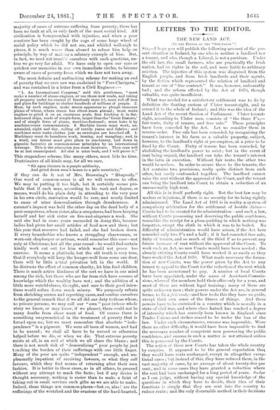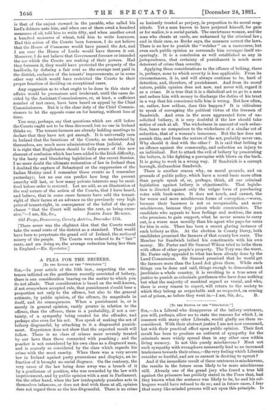LETTERS TO THE EDITOR.
THE NEW LAND ACT.
LTO THE EDITOR OF THE " SPECTATOR."1
SIR,—I hope you will publish the following account of the pre- sent situation in Ireland, by one who is neither .a landlord nor a tenant, and who, though a Liberal, is not a partisan. Under the old law, the small farmers, who are practically the Irish nation, had no rights in the soil, and were liable to arbitrary eviction. The injustice of this system was disguised from the English people, and from Irish landlords and their agents, by the fiction which represented the relation of landlord and tenant as one of "free contract." It was, however, unbearably bad ; and the reform effected by the Act of 1870, though valuable, was quite insufficient.
What was needed for a satisfactory settlement was to fix by definition the floating custom of Ulster tenant-right, and to extend it to the whole of Ireland ; and this was the idea of the Land Act of the recent Session of Parliament. Ulster tenant- right, according to Ulster men, consists of " the three F's,— fair rents, fixity of tenure, and free sale." These principles have been conceded by the Act. Let us consider them in reverse order. Free sale has been conceded, by recognising the tenant's interest in his farm as a saleable property, suliject, however, to the landlord's right of pre-emption, at a price to be fixed by the Court. Fixity of tenure has been conceded, by abolishing the landlord's power to evict ; but in the event of rent being unpaid, the landlord can take the tenant's interest in the farm in execution. Without fair rents, the other two would be useless. In order to secure these to the tenants, the Act contains two provisions, really quite distinct from each other, but easily confounded together. The landlord cannot raise the rent without the approval of the Court, and the tenant can bring the landlord into Court to obtain a reduction of an unreasonably high rent.
All this is in itself perfectly right. But the best law may be useless or injurious, if there is no security for its being rightly administered. The Land Act of 1881 is in reality a system of compulsory arbitration for the settlement of hostile elaints- Courts had to be created for its administration—and such a law, without Courts possessing and deserving the public confidence, resembles the receipt for a plum-pudding in which nothing was forgotten, except the cloth in which it was to be boiled. No difficulty of administration would have arisen, if the Act here conceded only two F's and a half ; if it had conceded free sale, fixity of tenure, and so much of the third F as to prevent any future increase of rent without the approval of the Court. To work such an Act, no new Courts would have been needed ; the already existing Courts could have worked it as easily as they have worked the Act of 1870. What made necessary the forma- tion of new Courts, was the power given by the Act to any tenant to appeal to the Court for the reduction of the rent which he has been accustomed to pay. A number of local Courts have been appointed, under the name of Assistant-Commis- sions, whereof the members hold their office only for a year, and most of them are without legal training ; many of them are quite unknown men ; their powers under the Act are, in general terms, to fix a fair rent,—aud how to do this they have no guide, except their own sense of the fitness of things. And these powers have to be exercised in a country which is morally in a state of civil war, and where class hatred has reached a degree of intensity which has scarcely been known in England since Trades Unions and strikes ceased to be nudes the ban of the law. Under such circumstances, success was impossible. Were there no other difficulty, it would have been impossible to find the necessary number of competent men possess ing the public confidence, and success in such a matter is not attained unless this is possessed by the Courts.
The action of these new Courts has taken the whole country by surprise. It appeared to be the general expectation that they would leave rents unchanged, except in altogether excep- tional cases ; but instead of this, they have reduced them, in the vast majority of cases, by an average of about twenty-five per cent., and in some cases they have granted a reduction where the rent had been unchanged for a long period of years. So far as I can judge, without having any special knowledge of the questions in which they have to decide, their idea of their functions is simply that they are sent into the country to redace rents ; and the only discernible method in their decisions is that of the unjust steward in the parable, who called his lord's debtors unto him, and when one of them owed a hundred measures of oil, told him to write fifty, and when another owed a hundred measures of wheat, told him to write fourscore. Had this action of the Courts been foreseen, I do not believe that the House of Commons would have passed the Act, and I am sure the House of Lords would have thrown it out. Moreover, I do not believe that Government foresaw or intended the use which the Courts are making of their powers. Had they foreseen it, they would have protected the property of the landlords, by defining a fair rent as the average rent paid in the district, exclusive of the tenants' improvements, or in some other way which would have restricted the Courts to their proper function of deciding on exceptional cases.
Any suggestion as to what ought to be done in this state of affairs would be premature and irrelevant, until the cases de- cided by the Assistant Commissioners, or, at least, a sufficient number of test cases, have been heard on appeal by the Chief Commissioners. But it is the clear duty of the Chief Commis- sioners to let the appeals come on for hearing, without loss of time.
You may, perhaps, say that questions which are still before the Courts ought not to be thus discussed, but no one in Ireland thinks so. The tenant-farmers are already holding meetings to declare that they have not got enough. It is universally seen in Ireland that the functions of the Courts, as understood by themselves, are much more administrative than judicial. And it is right that Englishmen should be fully aware of this new element of confusion which has been added to the Irish difficulty, by the hasty and blundering legislation of the recent Session. I no more doubt the ultimate restoration of law in Ireland than I doubted the capture of Sebastopol or the suppression of the Indian Mutiny (and I remember those events as I remember yesterday) ; but no one can predict how long the present anarchy will last, or how many private interests may be sacri- ficed before order is restored. Let me add, as an illustration of the real nature of the action of the Courts, that I have heard, and believe, that in some cases farmers have sold the tenant- right of their farms at an advance on the previously very high price of tenant-right, in consequence of the belief of the pur- chaser that the Court will reduce the rent, as being exces-
[There never was the slightest idea that the Courts would take the usual rents of the district as a standard. That would have been to perpetuate the grand evil of Ireland, the sectional misery of the people. The Courts were ordered to fix " fair" rents, and are doing so, the average reduction being less than in England.—En. Spectator.]







































 Previous page
Previous page